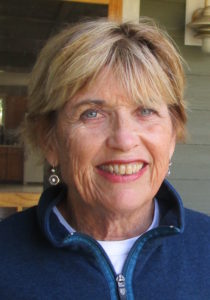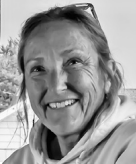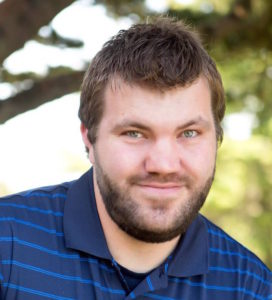YACHATS – While not quite as crowded a field as two years ago, there are choices for city of Yachats voters Nov. 8 when it comes to electing two council members.
Two councilors appointed in 2020 and 2021 – Mary Ellen O’Shaugnessey and Anthony Muirhead — are seeking their first election. Catherine Whitten-Carey, a member of the city’s Parks & Commons Commission, says she entered the race to give voters a choice. Two of the top vote-getters will take office in January along with a new mayor.
Whitten-Carey is a retired public school teacher and administrator; O’Shaugnessey is a retired university administrator; and Muirhead is the general manager of the Adobe motel and restaurant.
YachatsNews asked each seven questions. Here are their responses.
Question: Why are you running for Yachats city council?

O’Shaughnessey: I was appointed to the City Council in March 2020 to complete the term of a council member who resigned. The term ends in December. I gave much thought to my running for election and decided providing some continuity at this point would benefit the city. Continuity and stability are particularly important, as in the last six years, we have had five city managers, are electing our fifth mayor, and have seen a number of city councilors come and go. In addition, the city staff has experienced a great deal of turnover. Having this kind of churning of leadership and staff, it is hard to have a stable government. I will have no catching up to do, which would be required of someone who would be new to the council. There will be projects and other business on the agenda of which I’m knowledgeable, making it more likely to move along faster. Additionally, giving back to the community I live in is important to me, so serving on the council offers me that opportunity.
Whitten-Carey: I am running for Yachats city council as an option for people’s voices to be heard and to do the best for this community. There are both benefits and drawbacks to having a new member on the council. I see the benefits outweighing any drawbacks. Yes, I may not know the existing members very well, and have not been a part of “this is how it’s always been done.” On the other hand, I can bring in fresh ideas, be open to doing things differently, hear community voices that have been silenced, and work to support Yachats of the past and future.
Muirhead: It felt like the right thing to do during challenging times. I admit my life between work and teenagers doesn’t feel like I have a lot of time left to spare. I mostly came to the conclusion that I can’t sit on the sidelines and then complain about what is or isn’t being done to improve our future.
Question: What in your professional background or previous experience on commissions or council makes you a good choice for a council position?

Whitten-Carey: Backgrounds of candidates are important. Here in Yachats I have been an active member of the Parks & Commons Commission. I have also been involved with YYFAP, several community gardens, the Trails Team, and the banner project(s). During my professional career I worked for over 42 years in public service. I was a special education teacher for 20 years and a school administrator for 22 years. I have held certification as a principal, special education director and superintendent in Illinois, California and Oregon. In these roles I have had the opportunity to supervise, evaluate, hire/fire, and mentor hundreds of educators and work on leadership teams. Most importantly, I served to better the lives of many hundreds of students Pre-K through age 21. In these roles have also served as a building manager and budget and payroll facilitator. I have created programs from their inception, monitored building maintenance, and assisted in the design of a new school building and another large remodel.
Muirhead: I come from a business background that understands the challenges of small budgets. I also understand the need for working collaboratively and working through disagreements so that we are all rowing the ship together towards solutions.
O’Shaughnessey: I started my career right out of graduate school taking a job at the University of Illinois at Urbana Champaign as a health educator in the university’s student health center. Additionally, I taught classes in the Department of Community Health and had an appointment in the College of Medicine in the Social Medical program. In each of these jobs I learned the importance of building relationships in order to accomplish what it was I needed to do. While the deans I worked with were important, quite honestly it was always — and still is — the support staff I relied on the most. Eventually, I spent six years in Academic Human Resources, which oversaw the academic side of the university. There is no better place to learn how to deal with diverse personalities and situations. It takes specific skills – the ability to listen, to ask the right questions, to provide direction and guidance, to stay calm when there is chaos, and to be patient. Being aware that your decisions will impact people in a number of different ways is critical. Most importantly, it has taught me perseverance. All of these skills have served me well throughout my lifetime, including serving on the Planning Commission and City Council.
Question: Many people and some commissions are frustrated that issues and/or projects that have been on the city’s radar for 2-3-4 years have not been addressed. Do you feel that’s an issue? If so, how would you address it?

Muirhead: I sympathize with their frustration. I think Covid created a difficult situation that caused a lot of concerns and caution about how to proceed. That coupled with transition of leadership at the council level and City Hall really left everyone treading water. I believe people deserve answers and direction even if sometimes the answers may not be what they are wanting to hear. Kicking the can down the road needs to stop and we need to give clear “yes” or “no” responses to some of these projects.
O’Shaughnessey: I understand the frustration on the part of the commissions and citizens. There is no arguing that we need to get moving on the projects that have been approved, but are stalled. There may be valid reasons for some of the holdups and as we review the projects, we will have a better understanding of why. City Manager Heide Lambert recently hired a Capital Improvement Projects coordinator who will be helpful in catching up and moving forward. I am hopeful the projects needing council approval will be on the agenda in November, at the latest December.
Whitten-Carey: This is a significant issue. The mayor, city council and city manager need to have prioritized and documented projects, goals, timelines, and measurable outcome designs in place. These need to be addressed at each council meeting. The public needs to have a means of seeing these accountability measures in “real time” on the city’s web page and through other means, such as the newsletter.
The commissions must have their recommendations heard (not just listened to) and respected. The commissions are composed of very sophisticated and knowledgeable individuals donating their time and expertise to better the city. We must value their input and suggestions, as well as be accountable for the outcomes of their recommendations.
Question: Related to that: name your top three city projects to get off the ground, or get accomplished, in 2023?
O’Shaughnessey: Prioritize the recommendations of the city’s water and wastewater master plans; move forward on restocking our emergency supply caches; and identify ways to actively address our lack of workforce housing.
Whitten-Carey: Sorry, I can’t keep it to just three, so here are my top four: Most importantly we need to improve communication to and from the community.
I believe we need to provide for easy citizen access to budget and project accountability information and City Hall contact information, along with accountability for a response time. We need to value all voices in the community and provide ways in which everyone feels comfortable sharing their ideas.
It is crucial that we budget for the future, as well as wisely investing in our tomorrow today. Fiscal responsibility includes having clear 5- 10- and 25-year vision plans.
Safety of our citizens is of primary importance. This includes many things, from having a safe water supply and well maintained water treatment plant, to having a well-informed and assertive compliance officer, having up-to-date disaster stations and protocols, codes and regulations being adhered to, and finding ways to equitably reduce concerns pertaining to and supporting the unhoused.
Yachats is all about its people, natural spaces, trails, parks, music, art and tourism. This is what sustains us. Projects that have already been approved, but are stalled, need to be completed. Other projects that have been in the works and/or have been brought to the mayor, city council and city manager need to be honored and really listened to with a goal of getting things done.
Muirhead: First, I would like the rebuilding of East Second Street to stay front of mind so we can that resolved.
Second, I appreciate all the work that’s been done on the housing needs. I wish to be a better supporter of those efforts. I’d very much like our area to be sustainable for families to come and make the coast their home. The coast cannot become a place where only the wealthy can enjoy. Third, I’d like to keep supporting the efforts of the boardwalk. Making our downtown safer and more accessible benefits everyone.
I’m sure I should have listed water security at No. 1, but just know that is an area I know we must address.
Question: There is an increasing amount of conversations inside and outside of city hall on the role of Yachats’ commissions, committees and even “work groups” or “task forces.” Are these too demanding or generating too much work? Do we need fewer or a different approach? Can, or should they be managed better? If so, how? What would be your approach to working with commissions, or what would you suggest changing?
Whitten-Carey: It appears to me that this current approach with commissions, committees and teams has worked well enough for many years. Let’s not try to fix that which is not broken. We have much bigger tasks to manage at the moment. In the future this may be something that needs looking at, but right now we need to get other things in order and done. There are more important tasks at hand.
Muirhead: People want action on items if they are going to take the time to meet. That being said I believe we need to be realistic in our goals and clearly communicate timelines. I think that will benefit everyone and hope ease frustrations. I understand the challenges created by public meeting laws but also want to be as transparent as possible. I hope that we proceed with caution especially in projects that require a lot of city resources to accomplish.
O’Shaughnessey: Our commissions and committees, as well as work groups, are critically important to the success of the city. They provide countless hours of service to the city, pursuing an assortment of projects both short- and long-term. Overall, I think the commissions and committees are doing well in managing themselves. I would like to see better communication between City Hall and these groups, as well as the work groups. We now have a city manager who is still getting her feet on the ground because she entered into a very difficult situation. Relationships based on trust need to be built and that takes time. The city manager is meeting with a group of commission and committee members and two city councilors to discuss these issues. I trust this group will come up with answers that identify what is working well and where we may need some improvement and adjustments.
Question: For many people, the lack of meaningful or visible code enforcement has been an issue in Yachats for several years. What specific steps would you take to change that? Or, is it that big an issue?
Muirhead: In some ways yes and in some ways no. I believe we need to have the ability to enforce city codes. I don’t support turning Yachats into a big HOA where neighbors are pitted against each other
O’Shaughnessey: When I was on the Planning Commission (2018-2020) the lack of code enforcement was an issue. Since then, we have had code enforcement on and off with limited effectiveness. The good news is the city manager has hired a code enforcer who will start Nov. 1. I trust that we may see some changes in the near future.
Whitten-Carey: This is an important issue. The first step would be to hire a code enforcement officer, have that person know and understand city codes (as part of the hiring process), set timetables for each enforcement priority, set measurable outcomes, and report to the city manager. There should be a very clearly outlined schedule of what must be done, the timeline and the outcomes to be evaluated. Accountability. There is no reason for any rules or regulations unless we have a means of enforcing them. If this job, however, also entails building code enforcement, then accountability would rest with both the city manager and the city planner.
Question: What is the city’s role – if there is one– in the quest for more affordable and/or workforce housing in Yachats?
O’Shaughnessey: Affordable housing is a nationwide-problem that communities everywhere are struggling to address. It is in our best interests to be involved in finding solutions. We have just completed a “housing needs analysis” that identified our buildable land inventory and projected our 20-year needs. Unless we make significant changes, we will continue to not meet the needs of those who need affordable housing. One solution is for the city to identify incentives for developers to build the housing units we are going to need in the next 20 years. We should also be reviewing our municipal code to look for opportunities to provide incentives for multi-family development.
Whitten-Carey: The city can address homeless/unhoused issues with new and innovative ideas to assist those in need. The city must also continue being an active member of the $1 million grant that Lincoln County received to help with this issue.
It is also our role to seek ways to provide more affordable and/or workforce housing in Yachats. This is the only sustainable way to continue being a vacation/holiday resort town. Without the valued workers we will not succeed or thrive. I believe we should have organized, tasteful tiny-house communities that include designated green space. In addition to that, if those who own lots (large enough) were allowed to build an addition or second long-term rental home on that property it may allow owners to gain income and help our community at the same time. Provide incentives to sellers for securing buyers who are going to be full-time residents. Increase monitoring of second home buyers and rental units. Too many homes in Yachats sit empty for much of the year while many sleep on benches or in cars. I do not support multi-home, multiple story complexes being built in Yachats.
Muirhead: I believe we all have a role to play. The city should support affordable housing efforts and get people off the streets/cars and into beds. This is a great example of making it easier not harder when people want to step up and do the right thing. I truly believe, however, that the housing crisis needs to be looked at honestly by everyone as individuals. Where did we go wrong where families could find housing in the not so distant past but now feels impossible? I don’t believe the government will build us out of this mess. How should we get private individuals interested in renting homes to long-term tenants again. People don’t rent homes from the government — or at least they didn’t use to have to.


